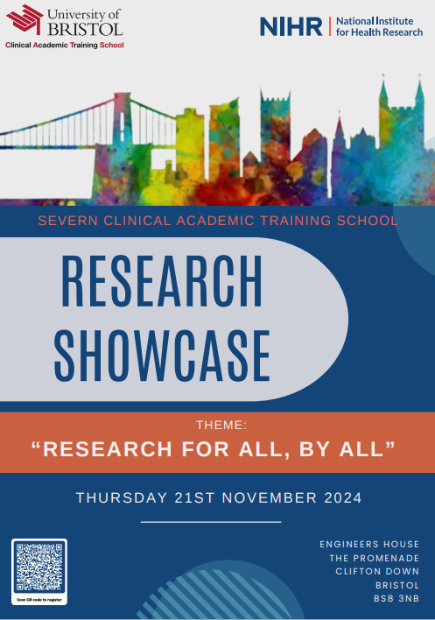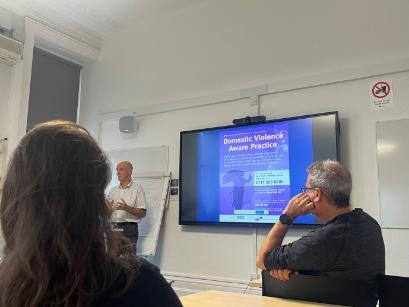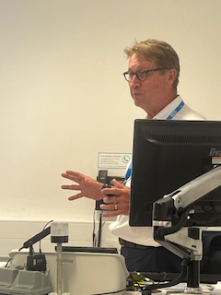2024 Events
Research Showcase - November 2024

Clinical Academic Training School Research Showcase 2024 poster and program (PDF, 1,489kB)
An Evening of Inspiration: Prof Gene Feder's Talk to the Clinical Academic Training School - September 2024
The Clinical Academic Training (CAT) School was excited to welcome the esteemed Professor Gene Feder for an insightful talk. The event, which was well attended, proved to be an unforgettable evening filled with thought-provoking discussions, practical advice and of course, pizza.
An Academic Powerhouse
Prof Gene Feder, a name synonymous with ground-breaking research in primary care, has been a significant figure in the academic world since joining the University of Bristol in 2007 from Queen Mary University of London. His work has had a profound impact, transforming trial evidence into national programs that make a real difference in people’s lives. This evening, he shared his journey and research insights, making them relevant and accessible to the academic clinicians in our audience.
The Spark for a Lifetime of Research
Prof Feder began his talk by sharing a deeply personal and professional turning point—how a single patient encounter shaped his entire research career. This moment, he explained, was a catalyst that drove him to explore the complex and often overlooked issue of domestic and sexual violence. His clinical experiences, coupled with the influence of domestic violence campaigners, led him to focus his research on this critical area, specifically within the context of primary care.
Domestic Violence: A Global Pandemic
Prof Feder highlighted the alarming prevalence of partner and sexual violence, describing it as a pandemic, as echoed in a 2021 WHO report. He shared striking statistics: up to a quarter of the global population has experienced physical or sexual violence, with physical abuse reported more frequently than sexual violence. His work, including a cross-sectional study in primary care, revealed that 41% of women had experienced physical intimate partner violence (IPV) in their lifetime, with 17% in the past year alone. Despite these staggering figures, less than a fifth of these cases had been recognised or recorded by healthcare professionals, underscoring a critical gap in the healthcare response.
Bridging the Gap: The IRIS Intervention
Prof Feder introduced the IRIS (Identification and Referral to Improve Safety) intervention model, a pioneering initiative aimed at addressing this gap. The model, which includes posters, clinical inquiries, validation, immediate risk assessment, and referrals to domestic violence agencies, has shown promise in improving outcomes for victims. He emphasised the importance of identifying and referring victims early, linking this approach to an earlier Cochrane review that demonstrated the significance of advocacy and emotional support in reducing abuse and improving quality of life and mental health.
The Challenges and Triumphs of Research
Throughout the evening, Prof Feder remained modest about his achievements, particularly when discussing the outcomes of his research. He shared the results of a cluster randomised controlled trial (RCT) that tested the effectiveness of the IRIS intervention. While the changes observed were modest, the study nonetheless marked a significant step forward in the field. He also touched on the challenges of implementing such interventions outside the controlled environment of a trial, a task he has been actively pursuing with the adoption of IRIS in 20% of primary care settings.
Lessons for Aspiring Researchers
In addition to his research insights, Prof Feder imparted valuable lessons for those in attendance. He stressed the importance of considering the pathways to impact from the conception of a study, including the need for cost-effectiveness analyses, strategic partnerships, and patient and public involvement (PPI) from the outset. He highlighted the role of funding for knowledge mobilisation and the production of non-academic outputs as critical elements for successful research dissemination.
Finally, Prof Feder reminded us of the unpredictable nature of research—sometimes, success requires a bit of luck and a lot of collaboration with great colleagues.
A Night to Remember
The evening concluded with a lively Q&A session, where attendees, including a maxillofacial clinician, engaged in discussions about the stigma associated with injuries of abuse and the broader implications of Prof Feder's research. The evening was a resounding success, leaving everyone inspired and eager to apply the lessons learned to their own clinical and academic work.
As we wrapped up the night, one thing was clear: Prof Gene Feder’s visit was more than just a talk; it was a powerful reminder of how one clinical encounter can spark a lifetime of meaningful research.

Memorable Academic Gathering: Insights from Professor John Iredale
We extend our thanks to everyone who attended Professor John Iredale's enlightening academic visit, both in person and online. The event, which saw the participation of 30 academics, was a rich tapestry of shared experiences and insights.
Professor Iredale, internationally renowned for his work on liver fibrosis, emphasised the importance of intellectual generosity and the paramount role of people in academic success. "It's about the team – they are your legacy," he remarked, highlighting the necessity of developing others and fostering multi-disciplinary collaborations.
One of the key takeaways from his talk was the perspective on research outcomes. "If your result doesn’t fit your hypothesis, have another look – it may be more useful than one that does!" he advised, encouraging researchers to embrace unexpected findings and the potential they hold.
Facing Challenges Head-On
Professor Iredale shared candid reflections on his journey, including the trials and tribulations he faced. "Stuff happens! Don’t shy away from the difficult and the critical," he urged. He spoke of how his family kept him grounded through his career highs and lows.
Reflecting on his entry into the field of liver research, he humorously pondered, "How did I get into this?" recounting his interactions with notable colleagues like Kushala Abeysekera, Stuart Forbes, Tim Kendall, Neil Henderson, Prakash Ramachandran and Jonathan Fallowfield. Plus the international greats of the fibrosis field. His recommendation of hillwalking in Ben Nevis as a source of inspiration was well-received.
A particularly moving moment was his discussion of a self-portrait from a patient at Addenbrooke’s Hospital who was post liver transplant, demonstrating the profound impact of the disease.
Breakthroughs in Liver Research
Professor Iredale's journey in liver research began with the development of a model focusing on hepatic stellate cells and their role in liver fibrosis. His ground-breaking work revealed that fibrosis, once thought to be irreversible, can indeed regress under certain conditions. This challenged the long-standing dogma and opened new avenues for treatment.
He explained how fibrosis causes portal hypertension and contributes to 40% of deaths in affected populations, and is particularly challenging for those from both developed and developing countries. His research demonstrated the complex interactions between collagenase and TIMP1, a potent collagenase inhibitor, and the pathological model of matrix degradation.
Collaboration and Generosity in Research
Throughout his career, Professor Iredale has been a proponent of collaboration and the sharing of ideas. His generous approach has fostered cross-disciplinary and international partnerships, significantly advancing the field of liver research. "Conversations and being generous with ideas – sharing data nationally and internationally with multidisciplinary clinical groups – are crucial," he emphasised.
He also discussed the critical role of hepatic macrophages in both fibrogenesis and the resolution of fibrosis. His studies showed the impact of macrophages in remodelling scarring, underscoring their importance in liver health.
Perseverance and Reflection
Professor Iredale's career is a testament to tenacity. He shared the challenges he faced, including the sudden loss of a mentor and the competitive nature of securing funding. His journey through the Medical Research Council (MRC) preparation and eventual fellowship demonstrated his resilience and dedication to his work.
"Go back to being who you are – stay close to those who are important to you," he advised, emphasising the importance of maintaining one's identity and support network amidst the pressures of an academic career.
In conclusion, Professor Iredale's visit was not just an academic discourse but a masterclass in the virtues of perseverance, collaboration and intellectual generosity. His reputation is not only built on the ground-breaking research he has conducted but also in the countless academics he has inspired and developed along the way.

Celia Gregson: 'Working as a Clinical Academic in a low middle income country setting' - April 2024
Our CAT training event was held on Wed 24th April in Canynge Hall by Professor Celia Gregson Celia’s talk, 'Working as a clinical academic in a Low Middle Income Country setting - practicalities and reflections' was accessible in person and via Teams.
Celia Gregson is a Professor of Clinical Epidemiology and a NIHR Global Health Research Professor of Healthy Ageing in sub-Saharan Africa, leading the Global Health and Ageing Research Unit at the University of Bristol and the Health Research Unit of Zimbabwe within the Biomedical Research and Training Institute in Harare. She is an Honorary Consultant Orthogeriatrician at the Royal United Hospital NHS Foundation Trust in Bath, UK. In 2018, Celia and colleagues founded the ‘Sub-Saharan African MuSculOskeletal Network’ (SAMSON; www.theSAMSON.org), which she co-directs. This network aims to build musculoskeletal research capacity across this region.
